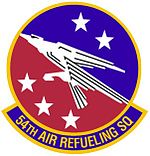The 54th Air Refueling Squadron is part of the 97th Air Mobility Wing at Altus Air Force Base, Oklahoma. It operates the Boeing KC-135 Stratotanker aircraft conducting air refueling training.
54th Air Refueling Squadron
 | |
|---|---|
 54th Air Refueling Squadron KC-135 and instructor pilot | |
| Active | 1942–1949; 1949–1965; 1972–1997; 1998–present |
| Country | |
| Branch | |
| Type | Air refueling |
| Role | Flight training |
| Part of | Air Education and Training Command |
| Garrison/HQ | Altus Air Force Base |
| Nickname(s) | Eager Beavers (1956–1965) Jesters |
| Decorations | Air Force Outstanding Unit Award |
| Insignia | |
| 54th Air Refueling Squadron emblem (Approved 6 June 1995)[1] |  |
| 54th Flying Training Squadron emblem (Approved 20 February 1973)[2] |  |
| 54th Troop Carrier Squadron emblem (approved 18 July 1956)[3] |  |
History
editAirlift operations
editThe 54th Transport Squadron was activated at Hamilton Field, California, but moved to Bowman Field, Kentucky, in June 1942, as the 54th Troop Carrier Squadron. Successive reassignments were to Florence Army Air Field, South Carolina, in August 1942, and to Elmendorf Field, Alaska, until inactivation on 5 March 1949. While there the 54th deployed to Rhein-Main Air Base, Germany, to support the Berlin Airlift.[2]
That inactivation lasted only six months and on 20 September 1949, the unit was activated again at Elmendorf and again moved to Donaldson Air Force Base, South Carolina, in July 1956, remaining in service until 25 June 1965.[2]
Pilot training
editOn 14 April 1972, the 54th received a new mission and name. It became the 54th Flying Training Squadron, and was stationed at Reese Air Force Base, Texas, with an official activation date of 1 October. Here personnel trained new pilots in the Northrop T-38 Talon until the 54th was once again inactivated in April 1997.[2]
Air refueling training
editThe 54th Air Refueling Squadron was reactivated at its current home of Altus Air Force Base, Oklahoma on 16 January 1998.[2] The 54th Air Refueling Squadron the only Boeing KC-135R Stratotanker flying training squadron in Air Education and Training Command. The squadron provides KC-135R initial and advanced flight qualification. The squadron's mission continues to encompass the training of all active duty, Air National Guard, Air Force Reserve and international KC-135 crewmembers. Over 70 instructors train 450 pilot and boom operator students annually for the Department of Defense and international customers.[4]
Lineage
edit- Constituted as the 54th Transport Squadron on 30 May 1942
- Activated on 1 June 1942
- Redesignated 54th Troop Carrier Squadron on 4 July 1942
- Redesignated 54th Troop Carrier Squadron, Heavy on 20 July 1948
- Inactivated on 5 March 1949
- Activated on 20 September 1949
- Discontinued and inactivated on 25 June 1965
- Redesignated 54th Flying Training Squadron on 14 April 1972
- Activated on 1 October 1972
- Inactivated on 1 April 1997
- Redesignated 54th Air Refueling Squadron on 1 January 1998
- Activated on 16 January 1998[2]
Assignments
edit
|
|
Stations
edit
|
|
Aircraft
edit- Lockheed C-60 Lodestar (1942–1944)
- Douglas C-47 Skytrain (1942–1949)
- Douglas C-54 Skymaster (1946–1949, 1949–1952)
- Fairchild C-82 Packet (1949, 1951–1952)
- Douglas C-124 Globemaster II (1952–1965)
- Northrop T-38 Talon (1972–1997)
- Boeing KC-135 Stratotanker (1998 – present)[2]
Awards
editAwards. Air Force Outstanding Unit Awards: 1 July 1957 – 10 December 1962; 1 January 1973 – 31 December 1974; 30 April 1981 – 29 April 1983; 1 April 1984 – 31 March 1986; 1 April 1988 – 31 March 1990; 1 October 1995–[1 April] 1997; [16 January] 1998-30 June 1998; 1 July 1998 – 30 June 1999; 1 July 1999 – 30 June 2000; 1 July 2000 – 30 June 2002; 1 July 2002 – 30 June 2004; 1 July 2004 – 30 June 2006; 1 July 2006 – 30 June 2007; 1 July 2007 – 30 June 2008; 1 July 2008–30 June 2009[2]
References
editNotes
edit- ^ Endicott, p. 593
- ^ a b c d e f g h i j Robertson, Patsy (18 October 2010). "Factsheet 54 Air Refueling Squadron (AETC)". Air Force Historical Research Agency. Archived from the original on 14 March 2016. Retrieved 19 March 2016.
- ^ Maurer, Combat Squadrons, pp. 224–225)
- ^ "54th Air Refueling Squadron". 97th Air Mobility Wing Public Affairs. June 2009. Archived from the original on 2 July 2010. Retrieved 19 March 2016.
Bibliography
editThis article incorporates public domain material from the Air Force Historical Research Agency
- Maurer, Maurer, ed. (1983) [1961]. Air Force Combat Units of World War II (PDF) (reprint ed.). Washington, DC: Office of Air Force History. ISBN 0-912799-02-1. LCCN 61060979.
- Maurer, Maurer, ed. (1982) [1969]. Combat Squadrons of the Air Force, World War II (PDF) (reprint ed.). Washington, DC: Office of Air Force History. ISBN 0-405-12194-6. LCCN 70605402. OCLC 72556.
- Ravenstein, Charles A. (1984). Air Force Combat Wings, Lineage & Honors Histories 1947-1977. Washington, DC: Office of Air Force History. ISBN 0-912799-12-9.